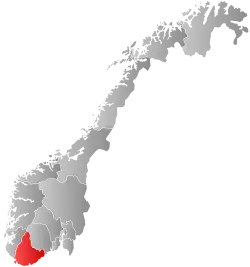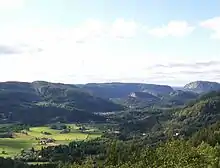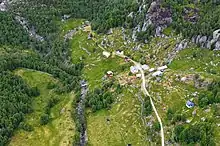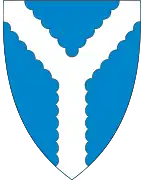Kvinesdal Municipality
Kvinesdal kommune | |
|---|---|
 View of the Kvinesdal valley | |
 Flag | |
 Agder within Norway | |
 Kvinesdal within Agder | |
| Coordinates: 58°20′17″N 07°01′23″E / 58.33806°N 7.02306°E | |
| Country | Norway |
| County | Agder |
| District | Lister |
| Established | 1 Jan 1838 |
| • Created as | Formannskapsdistrikt |
| Administrative centre | Liknes |
| Government | |
| • Mayor (2015) | Per Sverre Kvinlaug (KrF) |
| Area | |
| • Total | 963.21 km2 (371.90 sq mi) |
| • Land | 886.51 km2 (342.28 sq mi) |
| • Water | 76.70 km2 (29.61 sq mi) 8% |
| • Rank | #121 in Norway |
| Population (2022) | |
| • Total | 5,883 |
| • Rank | #161 in Norway |
| • Density | 6.6/km2 (17/sq mi) |
| • Change (10 years) | |
| Demonym | Kvindøl[1] |
| Official language | |
| • Norwegian form | Neutral |
| Time zone | UTC+01:00 (CET) |
| • Summer (DST) | UTC+02:00 (CEST) |
| ISO 3166 code | NO-4227[3] |
| Website | Official website |
Kvinesdal is a municipality in Agder county, Norway. It is located in the traditional district of Lister. The administrative centre of the municipality is the village of Liknes. Other villages in Kvinesdal include Feda, Fjotland, and Storekvina.
Kvinesdal is an elongated mountain-to-coast municipality, reaching saltwater at the head of the Fedafjorden, which provides access to the North Sea in the south. Further north, the landscape is cut by narrow valleys with scattered small villages. There are also abandoned mines at Knaben, a popular ski resort. Because Kvinesdal resembles the geography of the nation as a whole, it is often referred to as "Little Norway".[4]
The 963-square-kilometre (372 sq mi) municipality is the 121st largest by area out of the 356 municipalities in Norway. Kvinesdal is the 161st most populous municipality in Norway with a population of 5,883. The municipality's population density is 6.6 inhabitants per square kilometre (17/sq mi) and its population has increased by 0.8% over the previous 10-year period.[5][6]
Kvinesdal belongs to a central area in the Norwegian south from which many people emigrated to North America, particularly the United States, from the 1850s until the 1950s. It is noted for being an "American village" (Norwegian: Amerika-bygd) because of the high number of American residents. These are typically either Norwegians who moved to the States, obtained US Citizenship and later moved back to Norway, or are descendants of Norwegians who have never acquired Norwegian citizenship.
General information

.jpg.webp)
The parish of Kvinesdal was established as a municipality on 1 January 1838 (see formannskapsdistrikt law). In 1841, the neighboring municipality of Fjotland (population: 980) was merged with Kvinesdal to form a new, larger municipality of Kvinesdal, although this was short-lived. In 1858, the merger was un-done and Fjotland became a separate municipality once again. After the split, Kvinesdal had 4,485 residents.[7]
On 1 January 1900, the municipality of Kvinesdal was divided into two: the municipality of Feda in the far southern part (population: 1,090) and the municipality of Liknes in the northern part (population: 2,937). The name of Liknes municipality was changed (back) to Kvinesdal in 1917. During the 1960s, there were many municipal mergers across Norway due to the work of the Schei Committee. On 1 January 1963, the municipalities of Fjotland (population: 1,244), Feda (population: 576), and Kvinesdal (population: 3,218) were merged to form one large municipality of Kvinesdal.[7]
Name
The municipality (originally the parish) is named after the Kvinesdalen valley (Old Norse: Hvínisdalr). The first element of the name comes from the old name for the local Fedafjorden. The old name of the fjord was Hvínir. The old fjord name comes from the name of the main river, Kvina, which flows into the fjord. The old river name, Hvín is derived from the verb hvína which means "to squeal" or "to whistle". The last element of the name is dalr which means "valley" or "dale".[8]
In 1900, the municipality was renamed Liknes. This was short-lived, however, and in 1917 the name was changed back to Kvinesdal. The new name came from the old Liknes farm (Old Norse: Leiknes). The first element comes from the word leikr which means "game" or "sport". The last element is nes which means "headland". Thus, a headland for games or sports.[9][10]
Coat of arms
The coat of arms was granted on 15 March 1985. The official blazon is "Azure a pall engrailed argent" (Norwegian: I blått et sølv gaffelkors dannet ved taggesnitt). This means the arms have a blue field (background) and the charge is a Y-shaped figure called a pall with edges that are engrailed. The pall has a tincture of argent which means it is commonly colored white, but if it is made out of metal, then silver is used. The blue color in the field and the pall design was chosen to symbolize the meeting of the two local rivers: Kvina and Litleåna which join at the village of Liknes and then flow south together to the Fedafjorden. The arms were designed by Truls Nygaard who developed it using ideas by Hans Freddy Larsen and Lars Olsen. The municipal flag has the same design as the coat of arms.[11][12][13]
Churches
The Church of Norway has three parishes (sokn) within the municipality of Kvinesdal. It is part of the Lister og Mandal prosti (deanery) in the Diocese of Agder og Telemark.
| Parish (sokn) | Church name | Location of the church | Year built |
|---|---|---|---|
| Feda | Feda Church | Feda | 1802 |
| Fjotland | Fjotland Church | Fjotland | 1836 |
| Netlandsnes Chapel | Netland | 1886 | |
| Kvinesdal | Kvinesdal Church | Liknes | 1837 |
Geography
The long, narrow municipality of Kvinesdal stretches from the mountains in the north, along the Kvinesdalen valley to the Fedafjorden in the south. To the west, Kvinesdal is bordered by Flekkefjord and Sirdal municipalities. To the east, it is bordered by Åseral and Hægebostad. To the south, it is bordered by Lyngdal, and it is bordered by Farsund in the east and south. A small segment of the northern boundary borders Bygland municipality in Agder county.
The river Kvina, which runs through the municipality, is known for its salmon, and salmon fishing is a popular activity.
Two valleys meet in Kvinesdal's center: Vesterdalen (the Western Valley) through which flows the river Kvina and Austerdalen (the Eastern Valley) through which flows the river Litleåna to join the Kvina.
Climate
| Climate data for Liknes | |||||||||||||
|---|---|---|---|---|---|---|---|---|---|---|---|---|---|
| Month | Jan | Feb | Mar | Apr | May | Jun | Jul | Aug | Sep | Oct | Nov | Dec | Year |
| Daily mean °C (°F) | −2.0 (28.4) |
−2.0 (28.4) |
1.0 (33.8) |
4.5 (40.1) |
10.1 (50.2) |
13.7 (56.7) |
15.2 (59.4) |
14.7 (58.5) |
10.7 (51.3) |
7.4 (45.3) |
2.5 (36.5) |
−1.5 (29.3) |
6.2 (43.2) |
| Average precipitation mm (inches) | 180 (7.1) |
130 (5.1) |
135 (5.3) |
85 (3.3) |
105 (4.1) |
100 (3.9) |
115 (4.5) |
150 (5.9) |
205 (8.1) |
240 (9.4) |
240 (9.4) |
200 (7.9) |
1,885 (74.2) |
| Average precipitation days (≥ 1 mm) | 16.6 | 11.1 | 12.8 | 10.4 | 11.7 | 10.9 | 11.0 | 12.3 | 15.8 | 16.6 | 17.9 | 16.9 | 164 |
| Source: Norwegian Meteorological Institute[14] | |||||||||||||
Population
About 10% of the inhabitants of Kvinesdal are American citizens, and Kvinesdal does enjoy a special relationship with the United States. Every year, the municipality hosts a special festival remembering the days when local people emigrated to the new world.
History

Kvinesdal was home of many prominent characters in the Saga Period. Among them were the Skald Tjodolv the Frode. Frode means one with great knowledge of the history of ancestors. He composed a historic poem for his king Harold Fairhair. His work was later combined into the Heimskringla when it was recorded by Snorri Sturluson.
In northern Kvinesdal, along the high plateau which sits at 550 metres (1,800 ft) above sea level, records show that the Salmeli Farm dates back at least to the year 1300. During the Black Death years of 1350 the farm became deserted, but was back as a working farm again by 1647. It is now a historic site.
The bailiff Stig Bagge, who was granted local leadership from 1536 to 1542 by king Christian III, was an energetic man when he lived at his ancestral home of Eikeland in Kvinesdal. According to the reports of Peder Claussøn Friis, he executed refractory peasants so willingly that the district thought it was to excess; he was the district's bogeyman for many years thereafter. When the bailiff in Nedenes was killed in his bed and rebels came in an unsuccessful attempt to capture and execute Stig, he collected his men and brutally stifled the revolt. Stig himself died by being drawn and quartered by the Dutch when he was caught in piracy or espionage off their coast at Walcheren.[15]
Government
All municipalities in Norway are responsible for primary education (through 10th grade), outpatient health services, senior citizen services, welfare and other social services, zoning, economic development, and municipal roads and utilities. The municipality is governed by a municipal council of directly elected representatives. The mayor is indirectly elected by a vote of the municipal council.[16] The municipality is under the jurisdiction of the Agder District Court and the Agder Court of Appeal.
Municipal council
The municipal council (Kommunestyre) of Kvinesdal is made up of 27 representatives that are elected to four year terms. The tables below show the current and historical composition of the council by political party.
| Party name (in Norwegian) | Number of representatives | |
|---|---|---|
| Labour Party (Arbeiderpartiet) | 6 | |
| Progress Party (Fremskrittspartiet) | 4 | |
| Conservative Party (Høyre) | 4 | |
| Christian Democratic Party (Kristelig Folkeparti) | 7 | |
| Centre Party (Senterpartiet) | 6 | |
| Total number of members: | 27 | |
| Party name (in Norwegian) | Number of representatives | |
|---|---|---|
| Labour Party (Arbeiderpartiet) | 9 | |
| Progress Party (Fremskrittspartiet) | 5 | |
| Green Party (Miljøpartiet De Grønne) | 1 | |
| Conservative Party (Høyre) | 5 | |
| Christian Democratic Party (Kristelig Folkeparti) | 5 | |
| Centre Party (Senterpartiet) | 2 | |
| Total number of members: | 27 | |
| Party name (in Norwegian) | Number of representatives | |
|---|---|---|
| Labour Party (Arbeiderpartiet) | 11 | |
| Progress Party (Fremskrittspartiet) | 4 | |
| Conservative Party (Høyre) | 5 | |
| Christian Democratic Party (Kristelig Folkeparti) | 5 | |
| Centre Party (Senterpartiet) | 2 | |
| Total number of members: | 27 | |
| Party name (in Norwegian) | Number of representatives | |
|---|---|---|
| Labour Party (Arbeiderpartiet) | 9 | |
| Progress Party (Fremskrittspartiet) | 7 | |
| Conservative Party (Høyre) | 3 | |
| Christian Democratic Party (Kristelig Folkeparti) | 5 | |
| Centre Party (Senterpartiet) | 3 | |
| Total number of members: | 27 | |
| Party name (in Norwegian) | Number of representatives | |
|---|---|---|
| Labour Party (Arbeiderpartiet) | 6 | |
| Progress Party (Fremskrittspartiet) | 6 | |
| Conservative Party (Høyre) | 3 | |
| Christian Democratic Party (Kristelig Folkeparti) | 4 | |
| Centre Party (Senterpartiet) | 4 | |
| Liberal Party (Venstre) | 1 | |
| Cross-party list (Tverrpolitisk liste) | 3 | |
| Total number of members: | 27 | |
| Party name (in Norwegian) | Number of representatives | |
|---|---|---|
| Labour Party (Arbeiderpartiet) | 7 | |
| Progress Party (Fremskrittspartiet) | 5 | |
| Conservative Party (Høyre) | 7 | |
| Christian Democratic Party (Kristelig Folkeparti) | 9 | |
| Centre Party (Senterpartiet) | 5 | |
| Liberal Party (Venstre) | 2 | |
| Total number of members: | 35 | |
| Party name (in Norwegian) | Number of representatives | |
|---|---|---|
| Labour Party (Arbeiderpartiet) | 8 | |
| Progress Party (Fremskrittspartiet) | 3 | |
| Conservative Party (Høyre) | 5 | |
| Christian Democratic Party (Kristelig Folkeparti) | 10 | |
| Centre Party (Senterpartiet) | 7 | |
| Socialist Left Party (Sosialistisk Venstreparti) | 1 | |
| Liberal Party (Venstre) | 1 | |
| Total number of members: | 35 | |
| Party name (in Norwegian) | Number of representatives | |
|---|---|---|
| Labour Party (Arbeiderpartiet) | 8 | |
| Progress Party (Fremskrittspartiet) | 3 | |
| Conservative Party (Høyre) | 5 | |
| Christian Democratic Party (Kristelig Folkeparti) | 10 | |
| Centre Party (Senterpartiet) | 6 | |
| Socialist Left Party (Sosialistisk Venstreparti) | 2 | |
| Liberal Party (Venstre) | 1 | |
| Total number of members: | 35 | |
| Party name (in Norwegian) | Number of representatives | |
|---|---|---|
| Labour Party (Arbeiderpartiet) | 9 | |
| Conservative Party (Høyre) | 8 | |
| Christian Democratic Party (Kristelig Folkeparti) | 9 | |
| Centre Party (Senterpartiet) | 2 | |
| Socialist Left Party (Sosialistisk Venstreparti) | 1 | |
| Liberal Party (Venstre) | 1 | |
| Local list (Bygdelista) | 5 | |
| Total number of members: | 35 | |
| Party name (in Norwegian) | Number of representatives | |
|---|---|---|
| Labour Party (Arbeiderpartiet) | 7 | |
| Conservative Party (Høyre) | 6 | |
| Christian Democratic Party (Kristelig Folkeparti) | 8 | |
| Centre Party (Senterpartiet) | 2 | |
| Socialist Left Party (Sosialistisk Venstreparti) | 1 | |
| Liberal Party (Venstre) | 1 | |
| Local list against forced renovation (Bygdeliste mot tvungen renovasjon) | 10 | |
| Total number of members: | 35 | |
| Party name (in Norwegian) | Number of representatives | |
|---|---|---|
| Labour Party (Arbeiderpartiet) | 9 | |
| Conservative Party (Høyre) | 9 | |
| Christian Democratic Party (Kristelig Folkeparti) | 10 | |
| Liberal People's Party (Liberale Folkepartiet) | 1 | |
| Centre Party (Senterpartiet) | 2 | |
| Socialist Left Party (Sosialistisk Venstreparti) | 1 | |
| Liberal Party (Venstre) | 2 | |
| Local list for Feda, Fjotland, and Kvinesdal (Bygdeliste for Feda, Fjotland og Kvinesdal) | 1 | |
| Total number of members: | 35 | |
| Party name (in Norwegian) | Number of representatives | |
|---|---|---|
| Labour Party (Arbeiderpartiet) | 7 | |
| Conservative Party (Høyre) | 7 | |
| Christian Democratic Party (Kristelig Folkeparti) | 12 | |
| New People's Party (Nye Folkepartiet) | 1 | |
| Centre Party (Senterpartiet) | 2 | |
| Socialist Left Party (Sosialistisk Venstreparti) | 1 | |
| Liberal Party (Venstre) | 3 | |
| Non-party list for Feda, Kvinesdal, and Fjotland (Upolitisk liste for Feda, Kvinesdal og Fjotland) | 2 | |
| Total number of members: | 35 | |
| Party name (in Norwegian) | Number of representatives | |
|---|---|---|
| Labour Party (Arbeiderpartiet) | 12 | |
| Conservative Party (Høyre) | 4 | |
| Christian Democratic Party (Kristelig Folkeparti) | 9 | |
| Centre Party (Senterpartiet) | 3 | |
| Liberal Party (Venstre) | 6 | |
| Local List(s) (Lokale lister) | 1 | |
| Total number of members: | 35 | |
| Party name (in Norwegian) | Number of representatives | |
|---|---|---|
| Labour Party (Arbeiderpartiet) | 11 | |
| Conservative Party (Høyre) | 4 | |
| Christian Democratic Party (Kristelig Folkeparti) | 9 | |
| Centre Party (Senterpartiet) | 2 | |
| Liberal Party (Venstre) | 7 | |
| Local List(s) (Lokale lister) | 2 | |
| Total number of members: | 35 | |
| Party name (in Norwegian) | Number of representatives | |
|---|---|---|
| Labour Party (Arbeiderpartiet) | 12 | |
| Conservative Party (Høyre) | 4 | |
| Christian Democratic Party (Kristelig Folkeparti) | 8 | |
| Centre Party (Senterpartiet) | 3 | |
| Liberal Party (Venstre) | 8 | |
| Total number of members: | 35 | |
| Party name (in Norwegian) | Number of representatives | |
|---|---|---|
| Labour Party (Arbeiderpartiet) | 6 | |
| Conservative Party (Høyre) | 4 | |
| Christian Democratic Party (Kristelig Folkeparti) | 5 | |
| Liberal Party (Venstre) | 7 | |
| Local List(s) (Lokale lister) | 3 | |
| Total number of members: | 25 | |
| Party name (in Norwegian) | Number of representatives | |
|---|---|---|
| Labour Party (Arbeiderpartiet) | 6 | |
| Conservative Party (Høyre) | 2 | |
| Christian Democratic Party (Kristelig Folkeparti) | 5 | |
| Farmers' Party (Bondepartiet) | 2 | |
| Liberal Party (Venstre) | 7 | |
| Local List(s) (Lokale lister) | 3 | |
| Total number of members: | 25 | |
| Party name (in Norwegian) | Number of representatives | |
|---|---|---|
| Labour Party (Arbeiderpartiet) | 6 | |
| Conservative Party (Høyre) | 1 | |
| Christian Democratic Party (Kristelig Folkeparti) | 5 | |
| Farmers' Party (Bondepartiet) | 1 | |
| Liberal Party (Venstre) | 6 | |
| Local List(s) (Lokale lister) | 5 | |
| Total number of members: | 24 | |
| Party name (in Norwegian) | Number of representatives | |
|---|---|---|
| Labour Party (Arbeiderpartiet) | 4 | |
| Communist Party (Kommunistiske Parti) | 1 | |
| Christian Democratic Party (Kristelig Folkeparti) | 6 | |
| Local List(s) (Lokale lister) | 13 | |
| Total number of members: | 24 | |
| Party name (in Norwegian) | Number of representatives | |
|---|---|---|
| Labour Party (Arbeiderpartiet) | 6 | |
| Communist Party (Kommunistiske Parti) | 1 | |
| Local List(s) (Lokale lister) | 17 | |
| Total number of members: | 24 | |
| Party name (in Norwegian) | Number of representatives | |
|---|---|---|
| Labour Party (Arbeiderpartiet) | 7 | |
| Liberal Party (Venstre) | 4 | |
| Local List(s) (Lokale lister) | 13 | |
| Total number of members: | 24 | |
| Note: Due to the German occupation of Norway during World War II, no elections were held for new municipal councils until after the war ended in 1945. | ||
Mayors
The mayors (Norwegian: ordfører) of Kvinesdal (incomplete list):
- 1990-1999: Anders Mathias Larsen (KrF)
- 1999-2003: Sigmund Oksefjell (Sp)
- 2003-2013: Odd Omland (Ap)
- 2013-2015: Svein Arne Jerstad (Ap)
- 2015-present: Per Sverre Kvinlaug (KrF)
Economy
In addition to various small businesses and public services, Kvinesdal's economy is driven in part by hydroelectric power. The Sira-Kvina power company derives hydroelectric power from the Kvina river, in addition to various smaller dams. Eramet is an important local employer that provides work to about 200 persons in producing manganese-alloys.[35] There is also a small tourism industry, with golfing and fishing being the main draws.
Notable people


- Peder Jacobsen Bøgvald (1762 in Feda – 1829), a sea captain, farmer, and politician
- Kristian Marcelius Førland (1891–1978), an artist who lived and painted in Kvinesdal
- Erling Moi (1918 in Kvinesdal – 1944), a Norwegian resistance member in WWII
- Sigbjørn Hølmebakk (1922 in Feda – 1981), a Norwegian author
- Anne Gullestad (1925 in Kvinesdal – 1998), an actress and theatre director [36]
- Gordon Hølmebakk (1928 in Feda – 2018), a publishing editor, essayist, and novelist
- Aril Edvardsen (1938 in Kvinesdal – 2008), an evangelical preacher and missionary whose former home is now a museum
- Andreas Hompland (born 1946 in Kvinesdal), a social scientist, journalist, and non-fiction writer
- Arnfinn Moland (born 1951 in Kvinesdal), a Norwegian historian and writer
- Odd Omland (born 1956), a politician who was mayor of Kvinesdal from 2003 to 2013
- Per Sverre Kvinlaug (born 1974), a politician who was mayor of Kvinesdal starting in 2015
- Silvia Moi (born 1978 in Kvinesdal), a Norwegian opera singer [37]
- Luxus Leverpostei, (Norwegian Wiki), a Norwegian band formed in Kvinesdal in 1991
Sport
- Ludvig Hunsbedt, (Norwegian Wiki) (born 1961 in Kvinesdal), a rallycross driver
- Roger Eskeland (born 1977), a Norwegian football goalkeeper
- Atle Roar Håland (born 1977), a retired footballer with over 300 club caps
See also
References
- ↑ "Navn på steder og personer: Innbyggjarnamn" (in Norwegian). Språkrådet.
- ↑ "Forskrift om målvedtak i kommunar og fylkeskommunar" (in Norwegian). Lovdata.no.
- ↑ Bolstad, Erik; Thorsnæs, Geir, eds. (26 January 2023). "Kommunenummer". Store norske leksikon (in Norwegian). Kunnskapsforlaget.
- ↑ Welle-Strand, Erling (1996). Adventure Roads in Norway. Nortrabooks. ISBN 82-90103-71-9.
- ↑ Statistisk sentralbyrå. "Table: 06913: Population 1 January and population changes during the calendar year (M)" (in Norwegian).
- ↑ Statistisk sentralbyrå. "09280: Area of land and fresh water (km²) (M)" (in Norwegian).
- 1 2 Jukvam, Dag (1999). Historisk oversikt over endringer i kommune- og fylkesinndelingen (PDF) (in Norwegian). Statistisk sentralbyrå. ISBN 9788253746845.
- ↑ Rygh, Oluf (1912). Norske gaardnavne: Lister og Mandals amt (in Norwegian) (9 ed.). Kristiania, Norge: W. C. Fabritius & sønners bogtrikkeri. pp. 301–302.
- ↑ Store norske leksikon. "Kvinesdal" (in Norwegian). Retrieved 23 September 2016.
- ↑ Rygh, Oluf (1912). Norske gaardnavne: Lister og Mandals amt (in Norwegian) (9 ed.). Kristiania, Norge: W. C. Fabritius & sønners bogtrikkeri. p. 285.
- ↑ "Civic heraldry of Norway - Norske Kommunevåpen". Heraldry of the World. Retrieved 18 January 2023.
- ↑ "Kvinesdal, Vest-Agder (Norway)". Flags of the World. Retrieved 18 January 2023.
- ↑ "Godkjenning av våpen og flagg". Lovdata.no (in Norwegian). Norges kommunal- og arbeidsdepartementet. 15 March 1985. Retrieved 18 January 2023.
- ↑ "eKlima Web Portal". Norwegian Meteorological Institute. Archived from the original on 14 June 2004.
- ↑ Stagg, Frank Noel (1958). South Norway. George Allen & Unwin, Ltd.
- ↑ Hansen, Tore; Vabo, Signy Irene, eds. (20 September 2022). "kommunestyre". Store norske leksikon (in Norwegian). Kunnskapsforlaget. Retrieved 14 October 2022.
- ↑ "Tall for Norge: Kommunestyrevalg 2019 - Agder". Valg Direktoratet. Retrieved 5 December 2020.
- 1 2 3 4 "Table: 04813: Members of the local councils, by party/electoral list at the Municipal Council election (M)" (in Norwegian). Statistics Norway.
- ↑ "Tall for Norge: Kommunestyrevalg 2011 - Vest-Agder". Valg Direktoratet. Retrieved 5 December 2020.
- ↑ "Kommunestyrevalget 1995" (PDF) (in Norwegian). Oslo-Kongsvinger: Statistisk sentralbyrå. 1996. Retrieved 5 December 2020.
- ↑ "Kommunestyrevalget 1991" (PDF) (in Norwegian). Oslo-Kongsvinger: Statistisk sentralbyrå. 1993. Retrieved 5 December 2020.
- ↑ "Kommunestyrevalget 1987" (PDF) (in Norwegian). Oslo-Kongsvinger: Statistisk sentralbyrå. 1988. Retrieved 5 December 2020.
- ↑ "Kommunestyrevalget 1983" (PDF) (in Norwegian). Oslo-Kongsvinger: Statistisk sentralbyrå. 1984. Retrieved 5 December 2020.
- ↑ "Kommunestyrevalget 1979" (PDF) (in Norwegian). Oslo: Statistisk sentralbyrå. 1979. Retrieved 5 December 2020.
- ↑ "Kommunevalgene 1975" (PDF) (in Norwegian). Oslo: Statistisk sentralbyrå. 1977. Retrieved 5 December 2020.
- ↑ "Kommunevalgene 1972" (PDF) (in Norwegian). Oslo: Statistisk sentralbyrå. 1973. Retrieved 5 December 2020.
- ↑ "Kommunevalgene 1967" (PDF) (in Norwegian). Oslo: Statistisk sentralbyrå. 1967. Retrieved 5 December 2020.
- ↑ "Kommunevalgene 1963" (PDF) (in Norwegian). Oslo: Statistisk sentralbyrå. 1964. Retrieved 5 December 2020.
- ↑ "Kommunevalgene og Ordførervalgene 1959" (PDF) (in Norwegian). Oslo: Statistisk sentralbyrå. 1960. Retrieved 5 December 2020.
- ↑ "Kommunevalgene og Ordførervalgene 1955" (PDF) (in Norwegian). Oslo: Statistisk sentralbyrå. 1957. Retrieved 5 December 2020.
- ↑ "Kommunevalgene og Ordførervalgene 1951" (PDF) (in Norwegian). Oslo: Statistisk sentralbyrå. 1952. Retrieved 5 December 2020.
- ↑ "Kommunevalgene og Ordførervalgene 1947" (PDF) (in Norwegian). Oslo: Statistisk sentralbyrå. 1948. Retrieved 5 December 2020.
- ↑ "Kommunevalgene og Ordførervalgene 1945" (PDF) (in Norwegian). Oslo: Statistisk sentralbyrå. 1947. Retrieved 5 December 2020.
- ↑ "Kommunevalgene og Ordførervalgene 1937" (PDF) (in Norwegian). Oslo: Statistisk sentralbyrå. 1938. Retrieved 5 December 2020.
- ↑ "Eramet Norway Kvinesdal". Eramet Norway.
- ↑ IMDb Database retrieved 14 November 2020
- ↑ IMDb Database retrieved 14 November 2020
External links
 Vest-Agder travel guide from Wikivoyage
Vest-Agder travel guide from Wikivoyage- Municipal fact sheet from Statistics Norway (in Norwegian)
- Kvinesdal Guest House and Hotel (in Norwegian)
- Official website of Kvinesdal (in Norwegian)
- Webcam from Kvinesdal Archived 3 March 2016 at the Wayback Machine
- Tourist Information
- Kvinesdal Golf Club
- Kvinesdal Rock Festival
- Kvinesdaladressen - din egen @kvinesedal.co addresse!


